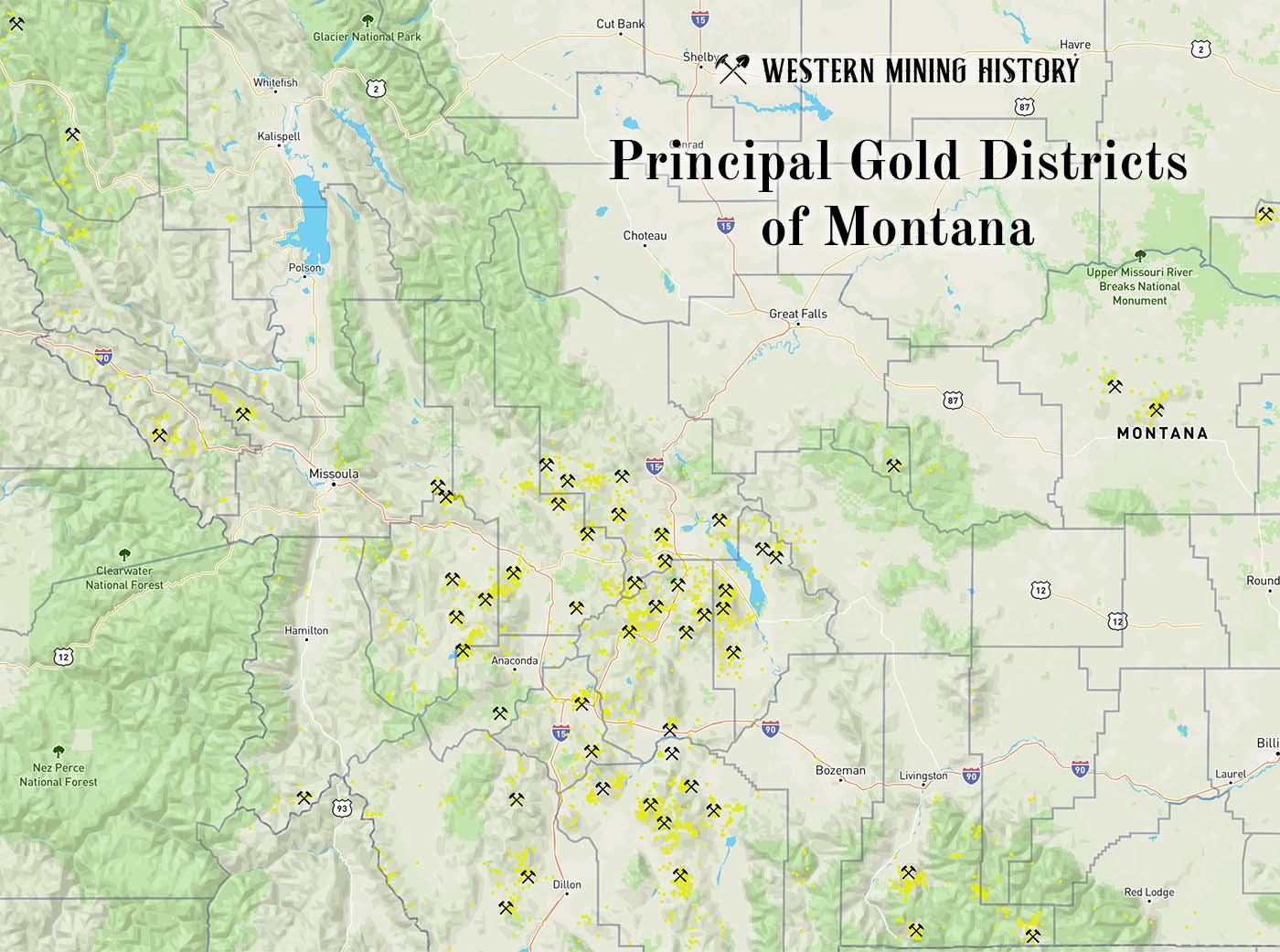The True Fissure Mine is a manganese, zinc, silver, and lead mine located in Granite county, Montana at an elevation of 5,899 feet.
About the MRDS Data:
All mine locations were obtained from the USGS Mineral Resources Data System. The locations and other information in this database have not been verified for accuracy. It should be assumed that all mines are on private property.
Mine Info
Elevation: 5,899 Feet (1,798 Meters)
Commodity: Manganese, Zinc, Silver, Lead
Lat, Long: 46.335, -113.26472
Map: View on Google Maps
True Fissure Mine MRDS details
Site Name
Primary: True Fissure Mine
Commodity
Primary: Manganese
Primary: Zinc
Primary: Silver
Primary: Lead
Secondary: Copper
Secondary: Gold
Tertiary: Arsenic
Tertiary: Antimony
Location
State: Montana
County: Granite
District: Philipsburg (Granite-Flint Creek) District
Land Status
Not available
Holdings
Not available
Workings
Type: Surface/Underground
Ownership
Owner Name: Taylor - Knapp Co.,
Home Office: Philipsburg, Mt 59858
Owner Name: Taylor - Knapp Co.
Production
Year: 1971
Time Period: 1900-1971
Mined: 20411656.650 mt
Material type: Zn
Year: 1971
Time Period: 1900-1971
Mined: 6803885.550 mt
Material type: Pb
Year: 1971
Time Period: 1900-1971
Mined: 22679618.500 mt
Material type: Mn
Year: 1971
Time Period: 1900-1971
Mined: 186620886.00 g
Material type: Ag
Year: 1971
Time Period: 1900-1971
Mined: 680388.550 mt
Material type: Cu
Year: 1971
Time Period: 1900-1971
Mined: 220462.200 mt
Material type: Ore
Deposit
Record Type: Site
Operation Category: Past Producer
Deposit Type: Polymetallic replacement
Operation Type: Unknown
Year First Production: 1900
Discovery Method: Ore-Mineral In Place
Years of Production:
Organization:
Significant: Y
Deposit Size: S
Physiography
General Physiographic Area: Rocky Mountain System
Physiographic Province: Northern Rocky Mountains
Physiographic Detail: Flint Creek Range
Mineral Deposit Model
Model Name: Polymetallic replacement
Orebody
Form: TABULAR, LENTICULAR, PODS
Structure
Type: R
Description: Philipsburg Batholith
Type: L
Description: Philipsburg Anticline, Philipsburg Overthrust
Alterations
Not available
Rocks
Not available
Analytical Data
Analytical Data: 30-40% MN, 30% SILICA
Materials
Ore: Galena
Ore: Psilomelane
Ore: Sphalerite
Ore: Tennantite
Comments
Comment (Deposit): Merged data from Deposit ID's 10071335 (Scratch Awl Vein), 10123776 (Horton Mine, Imperial Mine), 10245967 (Durango & Moorlight Group), and 10173142 (Scratch All Mine)
Comment (Deposit): SCRATCH AWL VEIN-ALL VEINS CONTAIN PB-ZN ORE. THE MN ORE BODY IS PART OF A QUARTZ VEIN THAT TRENDS E AND DIPS 70 S. IT IS OF TABULAR FORM, 3-5 FT WIDE, WITH MINIMUM STOPE LENGTH OF 180 FT AND PITCH LENGTH OF 100 FT. 3 GROUPS OF VEINS THE CLIFF, THE HORTON AND THE SCRATCH AWL, MOST OF THE AG-ZN AND MN ORE HAS COME FROM VEINS OF THE CLIFF GROUP
Comment (Geology): SCRATCH AWL VEIN-MINE IS ON EAST LIMB OF PHILIPSBURG ANTICLINE WHICH TRENDS ABOUT N 20 E AND PITCHES ABOUT 15 N.
Comment (Workings): SCRATCH AWL VEIN-PARTLY WORKED THROUGH THE SHARKTOWN TUNNEL. THE 500 FT LEVEL CONNECTS WITH THE TRUE FISSURE SHAFT TO THE NORTH AND THE CLIFF SHAFT TO THE WEST
Comment (Location): 800 FT N80E OF THE MIDNIGHT SHAFT.
Comment (Reserve-Resource): RESOURCES ESTIMATED BY ASSUMING WEDGE OF FAVORABLE HORIZONS (SILVER HILL, HASMARK, RED LION) HAS BEEN MINED TO A DEPTH OF 1200 FT AND COULD BE MINED AN ADDITIONAL 2800 FT.
Comment (Production): PRODUCTION FIGURES AND GRADES INCOMPLETE. ESTIMATES MAY BE IN ERROR BY 50% OR MORE IN SOME CASES. MOST PRODUCTION APPEARS TO BE FROM 1917-1918 AND 1950-1969.
Comment (Deposit): AT SOME PLACES SILICEOUS ORE MAKES OUT FROM THE FISSURE IN THE BEDDING OF THE COUNTRY ROCKS, AND AT THE SURFACE ABOVE THE TUNNEL LARGE KNOBS OF QUARTZ OUTCROP AT SEVERAL PLACES. THE VEIN ENDS AT THE CONTACT WITH THE GRANODIORTE.
Comment (Workings): TRUE FISSURE WORKINGS CONNECTED UNDERGROUND WITH SCRATCH AWL MINE ABOUT 400 M TO THE SW. MINE CONSISTS OF OPEN CUT FOR MN, A SHAFT WITH DRIFTS AND CROSSCUTS EXPLORING AT LEASE 3 VEINS, AN ADIT ON THE 100FT LEVEL, AND A LARGE OPEN PIT.
Comment (Geology): SEDIMENTARY ROCKS NEAR GRANODIORITE METAMORPHOSED TO MARBLE, BANDED WITH GARNET-AMPHIBOLE. MINE IS ON EXTREME EAST LIMB OF PHILIPSBURG ANTICLINE WHICH TRENDS ABOUT N 20 E AND PITCHES ABOUT 15 N
References
Reference (Deposit): USGS BULL 725, P. 146-174.
Reference (Deposit): USGS PP 78, P. 211.
Reference (Deposit): MBMG BULL 92, P. 10.
Reference (Deposit): USGS BULL 1237, P. 15-30, PLATES.
Reference (Production): USBM R.I. 4723, MINERALS YEARBOOKS, USGS BULL. 922-G
Reference (Deposit): USGS BULL 922-E, P. 157-204.
Reference (Deposit): USBM REP INVES 4723, 57 P.
Principal Gold Districts of Montana

In Montana, 54 mining districts have each have produced more than 10,000 ounces of gold. The largest producers are Butte, Helena, Marysville, and Virginia City, each having produced more than one million ounces. Twenty seven other districts are each credited with between 100,000 and one million ounces of gold production. Read more: Principal Gold Districts of Montana.